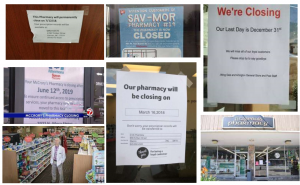Communities are losing Independent Pharmacies
Betty Chaffee/ August 30, 2019/ Medication Management, Medication Therapy Management, prescription drug costs/ 7 comments
All around the nation, local, independent pharmacies are closing their doors. This has been happening for some years now, and many of you may have experienced it personally. Independent pharmacies are being squeezed out of business by big chain pharmacies and pharmacy benefit managers, some of which don't put patient care at the top of their priority list. What's going on? How does it affect you?
 Family-owned Dexter Pharmacy closes after 40 years
Family-owned Dexter Pharmacy closes after 40 years
Family-run Dexter Pharmacy closed after 40 years and transferred all patient records to Walgreens.
This was a headline in the business section of the local news just last last Friday. Dexter Pharmacy was the only pharmacy in Dexter, and was an independent business at that. The community counted on Dexter Pharmacy because of the individual attention, relationships built over years, excellent service, and the ways in which it supported the local community. But suddenly, unsuspecting patients and customers intending to fill a prescription or purchase a product were faced with a locked door. The sign posted there directed them to a chain pharmacy with the closest store several miles away.
The pharmacy owner, Marni Schmid, stated in the news article that the pharmacy was forced to close because "There are some pharmacy benefit managers who were not paying us for prescriptions we filled. That creates a great cash flow problem." Can it really be true that pharmacies providing needed healthcare for patients aren't getting paid for what they do? Let's look at what's going on in the world of community pharmacy.
Why are independent pharmacies being forced to close?
It's complicated, but here goes. Let's start with prescription insurance companies, who many years ago needed help processing electronic claims from community pharmacies. Electronic claims were a big deal back then, and making sure they were dealt with quickly and accurately was important. They began using "middle-men" known as pharmacy benefit managers (PBMs) to process the claims.
But over the years, PBMs have morphed into huge businesses. PBMs now decide which drugs are covered by insurance companies, and to what extent they're covered. They've developed a rebate mechanism from drug manufacturers so that the costs of drugs are decreased. But instead of savings going back to the patients, many times it goes into the PBM's bottom line. At the same time, PBMs force community pharmacies into accepting contracts that, more often than not, result in the pharmacy taking a loss on prescriptions filled.
Then there are the "direct and indirect remuneration" (DIR) fees that are assessed to pharmacies. DIR fees encompass many different types of fees, but many of them are almost impossible to predict ahead of time. Imagine you rent an apartment and sign a contract for a monthly rental fee. The small print says something about "other incidental fees" but in order to live there you sign the contract anyway. For six months you're renting this apartment, staying within budget, thinking all is well, then suddenly your landlord hands you a bill for $1000.00 for carpet wear or window cleaning. How do you budget for that when the fees you're being charged aren't detailed up front? That's the kind of thing pharmacies face with DIR fees. They aren't assessed at the time the sale is made, so pharmacies can't know whether they're ultimately going to break even, make a small profit, or lose money. It all happens months later, making business planning difficult or impossible.
Maybe you're wondering why independent pharmacies are impacted by this more than large chain pharmacies. It's happening because many of the larger chain pharmacies own their own PBM. So when the PBM makes a big profit, the whole company benefits. It makes it really easy to squeeze out the competition (independents and small chains) when your own pharmacy benefits from the profits made by the PBM you own.
The United States Senate held a hearing in April, 2019, to investigate tactics used by PBMs. Recommendations were made to make pricing more transparent to the consumer. But new rules have not yet taken effect, so PBMs still use rebates and fees without clearly improving consumer cost. Here's a quote from the hearing:
"PBMs were originally created to control the cost of prescription drugs. If that ever was happening, it's not happening anymore," Hoey said. "We have no doubt that these large corporations and the outrageous fees they charge are driving higher prescription drug costs and killing small-business pharmacies."
So right now we continue down the path of gradually losing one independent pharmacy after another. Will it end before all we have left are large chain pharmacies who own their own PBM? Maybe, maybe not. But let's look at how it all affects you, the patient.
What do you do when your pharmacy suddenly closes down?
Keep in mind that most often, the pharmacy being forced to close did their best to ensure their patients a smooth transition to another pharmacy. In the case of Dexter Pharmacy, for example, all prescription records were acquired by Walgreen's Pharmacy in Ann Arbor. That information was posted on the pharmacy door the day it closed, and mailed to all active patients, to make sure everyone was aware of where to go or whom to call about their prescriptions. All the prescription records that were sold to Walgreen's are still valid. That means that remaining refills can still be requested -- there is no need to contact your prescriber for new prescriptions.
And, keep in mind, it's not mandatory that you use the pharmacy your records were sold to. You can choose any pharmacy you want (after making sure they accept your insurance coverage, of course). You'll need to contact the pharmacy who acquired your records though, and ask that your prescriptions be transferred to the pharmacy of your choice.
The more independent pharmacies we lose, the fewer choices we have
Your choice of pharmacy affects an important part of your medical care. Your pharmacy should provide prescriptions that are filled accurately and on time. (When I say on time, I don't mean while you wait. The pharmacist needs adequate opportunity to ensure accuracy. Whenever possible, don't wait at the pharmacy for your prescriptions to be filled - give them some time!) Ideally the pharmacy will have friendly staff members who develop relationships with you, and pharmacy technicians who are helpful and knowledgeable. And the pharmacist should have time in the schedule to provide Medication Management services and to step out to counsel you about new prescriptions.
It may be hard to find a pharmacy that fits all those criteria, and it will get harder and harder as the number of choices shrink. If you're lucky enough to still have a local, independent pharmacy in your community, do business there! Get all your prescription needs at that one pharmacy. Try to refrain from bouncing between pharmacies to get a lower price. Prescription medications are an important part of your healthcare - use a pharmacy you trust and stick with them.
If your new pharmacy doesn't provide medication education and counseling, remember to Contact Us at BetterMyMeds! We'll provide all the help you need to get the best health outcomes from your medicines!



Thank you, Betty, for providing excellent insight regarding this very complex problem that is both confusing and frustrating for pharmacies and patients alike.
Thanks for the reminder. It is sad to see businesses close. Also, is scary.
I agree with you, Ruth. Especially businesses that have had a place in the community for so long. It’s a shame that small, independent businesses that provide personal service can so easily be pushed out by big business.
I’m an independent pharmacy owner and that’s exactly what I’m dealing with, I’m so disappointed in the pharmacy profession in general.
I’m with you, Diane. I see hope for the future, though. What do you think our profession needs to do to move forward?
This is a great article and I will be sharing it with lots of our patients. We need to have a federal law that will pay a minimum dispensing fee for services provided. It won’t be the fix all but will at least let pharmacy owners know that they will be paid a minimum amount per claim and not just loosing money. DIR fees are shutting independents down. It may not appear that way to PSAO’s because people are selling to chain pharmacies. Our patients rely on us for delivery and more and more people will need delivery as we all get older. Mail order is not the solution. Insurance companies only care about money in their pockets and not about patients health. So sad. And it will only get worse until people open their eyes and start fighting with us. Thanks for letting me vent.
Mandy,
Thanks for your comments. I know you’re not alone in your angst. The biggest reason I wrote that article is to try to educate patients. Generally speaking, they have no idea why they pay so little for prescriptions, nor do they understand why their pharmacist doesn’t have time to talk to them routinely about their medicines. They don’t understand that many drug discount “coupons” are actually forcing pharmacies to take a loss. We need to make sure our patients know exactly what’s going on – many would rather stay with an independent pharmacy if they had the choice. I”m glad you plan to share the article with your patients!